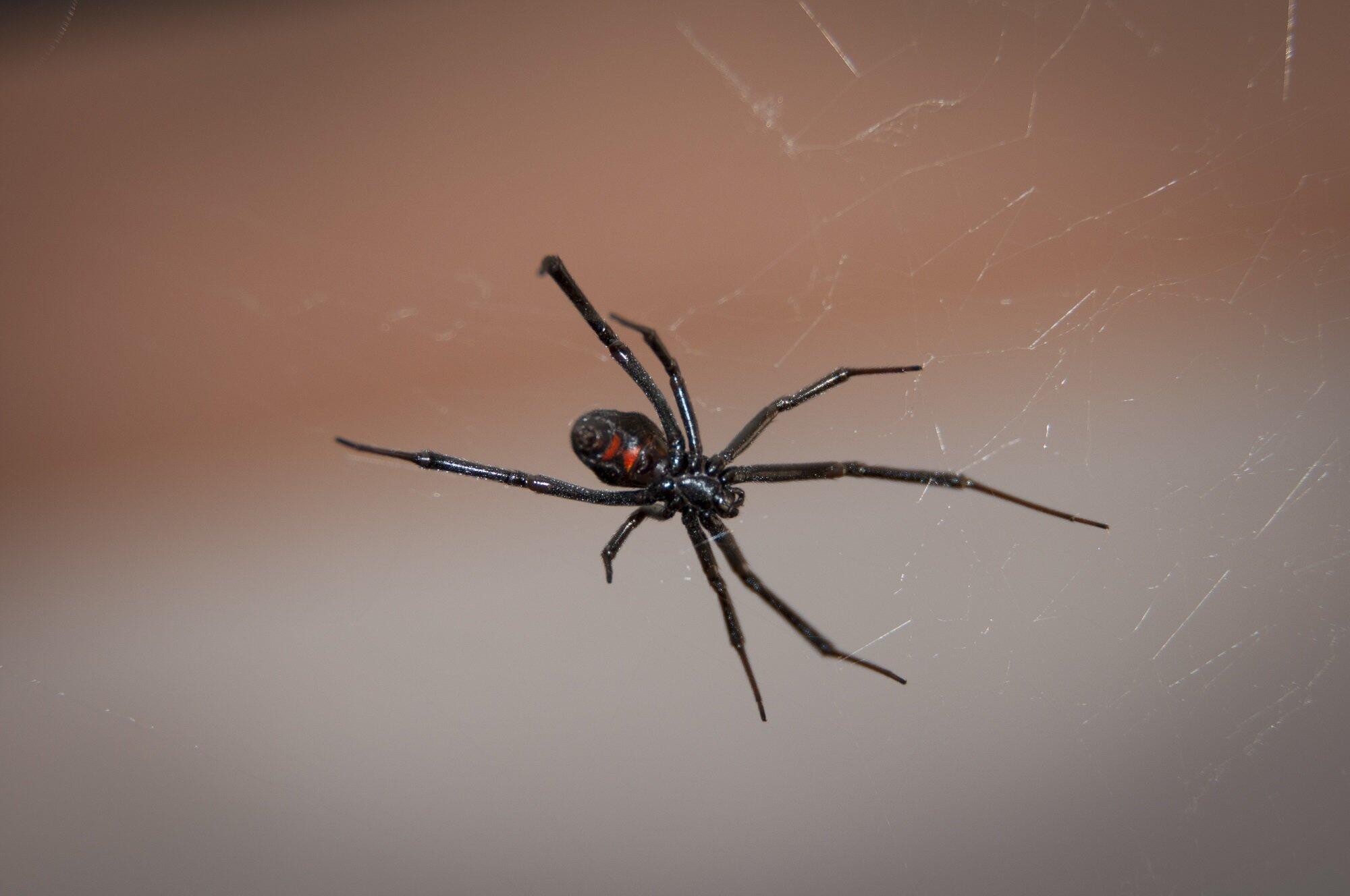Did you know that spiders are one of the most feared creatures in the United States? In fact, about 24% of Americans admit to being afraid of spiders, ranking it as the third most common fear after snakes and heights.
However, understanding these eight-legged critters can help alleviate some of that fear. In this article, we’ll explore the various types of common spiders in Tennessee, their role in the ecosystem, and the simple steps you can take to prevent them from invading your home.
We’ll discuss arachnids such as black widows, brown recluses, wolf spiders, jumping spiders, and more. Let’s dive in!
Common Spiders in Tennessee
Like them or hate them, spiders are a common sight in Tennessee, with various species inhabiting the state’s diverse landscapes. Let’s take a closer look at some of the most frequently encountered spiders in Tennessee and learn a bit about each one.
Brown Recluse Spider
The brown recluse spider, notorious for its venomous bite, is a cause of concern for many residents in Tennessee. Recognizable by the distinctive violin-shaped marking on its back, these spiders typically inhabit dark, undisturbed areas such as closets, attics, and basements.
Despite their fearsome reputation, brown recluse spiders are reclusive by nature and prefer to avoid human interaction. However, if threatened or trapped, they may bite, injecting venom that can lead to necrotic lesions in severe cases.
Due to the potential health risks associated with their bites, it’s essential to exercise caution and seek professional pest control assistance if you suspect a brown recluse infestation in your home.
Black Widow Spider
The black widow spider is another spider species found in Tennessee that often causes concern due to its venomous bite. These spiders are easily recognizable by their shiny black bodies and the distinctive red hourglass marking on their abdomens.
Black widows typically prefer dark, secluded areas like garages, sheds, and woodpiles, where they spin irregular webs to catch prey. While their venom is potent, fatalities from black widow bites are rare, and they will generally only bite if they feel threatened.
If you come across a black widow spider or suspect an infestation, it’s best to avoid contact and seek professional pest control assistance for safe removal.
Wolf Spider
The wolf spider, often mistaken for a tarantula due to its large size and hairy appearance, is another common spider found in Tennessee. Unlike many other spiders, wolf spiders do not build webs; instead, they hunt for prey on the ground.
These spiders can be found in various habitats, including grasslands, forests, and urban areas. While their bite can be painful, wolf spiders are not considered dangerous to humans and generally prefer to avoid confrontation.
Should you encounter a wolf spider, it’s best to leave it alone, as they play a beneficial role in controlling insect populations. Regular cleaning and decluttering can also help deter wolf spiders from entering your home.
Common House Spider
The common house spider is frequently found indoors, spinning messy webs in corners and crevices. These spiders are harmless to humans and primarily feed on insects.
While their presence may be unwelcome, especially in living spaces, common house spiders play a vital role in controlling insect populations. Regular cleaning and decluttering can help deter them from taking up residence in your home.
If you notice an abundance of common house spiders, sealing entry points and reducing indoor humidity can further discourage their presence. Remember, these spiders are more of a nuisance than a threat and can be safely managed with simple preventive measures.
Cellar Spider
Cellar spiders, commonly known as daddy longlegs, are often found in dark, damp areas such as basements and crawl spaces. These spiders have long, thin legs and are recognizable by their delicate appearance.
Despite their creepy look, cellar spiders are not venomous and pose no threat to humans. In fact, they help control insect populations by catching prey in their webs.
While encountering cellar spiders may startle some people, they are harmless creatures that contribute positively to the ecosystem. If you find cellar spiders in your home, simply leave them be or gently relocate them outdoors.
Jumping Spider
Jumping spiders are tiny arachnids known for their agility and distinctive hunting behavior. With excellent eyesight, they can leap several times their body length to catch prey.
These spiders are harmless to humans and even beneficial as natural pest controllers. While their sudden movements may startle some people, jumping spiders pose no threat and prefer to avoid confrontation.
Encountering a jumping spider indoors or outdoors is nothing to worry about. You can simply let them go about their business as they help keep insect populations in check.
Orb Weaver Spider
Finally, on this list, we have the orb weaver spider. Orb weaver spiders are skilled architects, spinning intricate orb-shaped webs to catch flying insects. These spiders are commonly found in gardens, fields, and wooded areas.
While their webs can be a nuisance when walking through outdoor spaces, orb weavers are harmless to humans. In fact, they play a vital role in controlling insect populations, making them beneficial creatures to have around.
So, again, if you come across an orb weaver spider or its web, simply admire its handiwork from a safe distance. These spiders are really more of a help than a hindrance in maintaining the balance of nature.
Identifying Spider Infestations
Knowing how to spot signs of a spider infestation can help you address the problem early on. Keep an eye out for spider webs, especially in corners, closets, and basements, where spiders like to hide. These webs can vary in size and shape depending on the species of spider.
Additionally, look for egg sacs, which are small, round structures that spiders use to lay their eggs. These sacs may be found in dark, secluded areas such as behind furniture or in storage boxes.
Another indicator of a spider infestation is seeing live spiders crawling around your home, especially if you notice them frequently in certain areas. If you suspect a spider infestation, it’s essential to take action to prevent it from getting worse.
Regularly cleaning and decluttering your home can help reduce hiding spots for spiders. Sealing cracks and crevices where spiders can enter your home can also help prevent infestations. If the problem persists, you should consider contacting pest control professionals for assistance.
Tips for Preventing Spider Infestations
Keeping spiders at bay begins with simple yet effective preventive measures that you can implement in and around your home. Here are some practical tips to help you prevent spider infestations.
Keep Your Home Clean
Regular cleaning and decluttering can significantly reduce hiding spots for spiders. Vacuuming floors, dusting furniture, and removing cobwebs from corners and ceilings can help keep spider populations in check.
Seal Entry Points
Spiders can enter your home through small cracks and openings in doors, windows, and walls. Seal these entry points with caulk or weather stripping to prevent spiders from gaining access to your living spaces.
Reduce Outdoor Habitats
Spiders are often attracted to outdoor areas with abundant hiding spots and prey. Keep vegetation trimmed and remove debris, such as piles of leaves and wood, from around your home’s exterior.
Install Screens on Windows and Doors
Installing screens on windows and doors can help prevent spiders from entering your home while still allowing fresh air to circulate. Be sure to repair any damaged screens to maintain their effectiveness.
Use Essential Oils as Repellents
Certain essential oils, such as peppermint, lavender, and tea tree oil, are known to repel spiders. Dilute these oils with water and spray them around entry points, windowsills, and other areas where spiders may enter.
Regularly Clean Outdoor Furniture
Spiders can hide in outdoor furniture, especially if it’s left undisturbed for long periods. Regularly inspect and clean outdoor furniture to remove any spiders or egg sacs that may be present.
Spiders’ Impact on Home Sales
Spiders can potentially impact a homeowner’s ability to sell their home by creating an unwelcoming atmosphere for potential buyers. Spider webs and sightings of spiders can give the impression that the property is not well-maintained or clean.
For individuals with arachnophobia, the presence of spiders can be a significant deterrent, leading them to avoid viewing or considering the property altogether.
Additionally, if a home has a severe spider infestation, it may indicate underlying issues such as structural deficiencies or excessive moisture. This could raise concerns for potential buyers about the overall condition of the property.
Therefore, addressing spider infestations before listing a home for sale can help improve its marketability and appeal to a wider range of buyers.
Sell Your House Without Any Stress or Hassle
The bottom line is that understanding and managing common spiders in Tennessee is essential for homeowners, as spider infestations can negatively impact their ability to sell their homes.
Fortunately, solutions like regular cleaning, decluttering, and professional pest control services can help address spider infestations effectively. For homeowners seeking a hassle-free solution, selling to us, We Buy Houses Memphis, offers a convenient option.
Simply fill in our quick form and request a cash offer today, providing a swift and stress-free way to sell your home.







